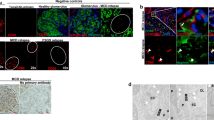Abstract
Background
Minimal Change Disease (MCD) is associated with CD80 expression in podocytes and elevated urinary CD80 excretion during active renal disease. We have evaluated the urinary excretion of CTLA-4 and CD80 during different stages of the nephrotic syndrome in patients with MCD to test the hypothesis that persistent increased urinary CD80 excretion in patients with MCD in relapse is due to an ineffectual CTLA-4 response of the host to curtail the activation of CD80.
Methods
Thirty-two children with biopsy-proven MCD were studied during relapse and/or remission. Eleven healthy subjects served as controls.
Results
Urinary CD80 excretion was significantly increased in MCD patients in relapse relative to that in MCD patients in remission (p < 0.001) and controls (p < 0.001). Although urinary CTLA-4 excretion was higher in MCD patients in relapse than in MCD patients in remission (p = 0.01) and controls (p = 0.03), no significant correlation was observed between urinary CD80 excretion and urinary CTLA-4 level in MCD patients at the time of relapse (p = 0.06). At the time of remission, CD80 had decreased significantly in all patients, but CTLA-4 levels either decreased or remained unchanged in all but five patients, and no correlation was observed between urinary CD80 excretion and CTLA-4 level (p = 0.7).
Conclusions
Urinary CTLA-4 levels do not correlate with urinary CD80 excretion, suggesting the possibility that the CTLA4 response may be suboptimal in this disease during relapse.



Similar content being viewed by others
References
Feehally J, Floege J, Johnson RJ (2007) Comprehensive clinical nephrology, 3rd edn. Mosby Elsevier, Philadephia, pp 209–216
Alwadhi RK, Mathew JL, Rath B (2004) Clinical profile of children with nephrotic syndrome not on glucorticoid therapy, but presenting with infection. J Paediatr Child Health 40:28–32
Ponticelli C, Glassock RJ (2010) Treatment of primary glomerulonephritis, 2nd edn. Oxford University Press, New York
Barisoni L, Schnaper HW, Kopp JB (2007) A proposed taxonomy for the podocytopathies: a reassessment of the primary nephrotic diseases. Clin J Am Soc Nephrol 2:529–542
Garin EH, Mu W, Arthur JM, Rivard CJ, Araya CE, Shimada M, Johnson RJ (2010) Urinary CD80 is elevated in minimal change disease but not in focal segmental glomerulosclerosis. Kidney Int 78:296–302
Garin EH, Diaz LN, Mu W, Wasserfall C, Araya C, Segal M, Johnson RJ (2009) Urinary CD80 excretion increases in idiopathic minimal-change disease. J Am Soc Nephrol 20:260–266
Ishimoto T, Shimada M, Gabriela G, Kosugi T, Sato W, Lee PY, Lanaspa MA, Rivard C, Maruyama S, Garin EH, Johnson RJ (2013) Toll-like receptor 3 ligand, polyIC, induces proteinuria and glomerular CD80, and increases urinary CD80 in mice. Nephrol Dial Transplant 28:1439–1446
Wing K, Onishi Y, Prieto-Martin P, Yamaguchi T, Miyara M, Fehervari Z, Nomura T, Sakaguchi S (2008) CTLA-4 control over Foxp3+ regulatory T cell function. Science 322:271–275
Shimada M, Araya C, Rivard C, Ishimoto T, Johnson RJ, Garin EH (2011) Minimal change disease: a “Two hit” podocyte immune disorder? Pediatr Nephrol 26:645–649
Churg J, Habib R, White RH (1970) Pathology of the nephrotic syndrome in children: a report for the International Study of kidney Disease in Children. Lancet 760:1299–1302
[No authors cited] (1981) Primary nephrotic syndrome in children: clinical significance of histopathologic variants of minimal change and of diffuse mesangial hypercellularity. A Report of the International Study of Kidney Disease in Children. Kidney Int 20:765–771
Oaks MK, Hallet KM (2000) Cutting edge: a soluble form of CTLA-4 in patients with autoimmune thyroid disease. J Immunol 164:5015–5018
Sharpe AH, Freeman GJ (2002) The B7-CD28 superfamily. Nat Rev Immunol 2:116–126
Niemann-Masanek U, Mueller A, Yard BA, Waldherr R, van der Woude FJ (2002) B7–1 (CD80) and B7–2 (CD86) expression in human tubular epithelial cells in vivo and in vitro. Nephron 92:542–556
Reiser J, von Gersdorff G, Loos M, Oh J, Asanuma K, Giardino L, Rastaldi MP, Calvaresi N, Watanabe H, Schwarz K, Faul C, Kretzler M, Davidson A, Sugimoto H, Kalluri R, Sharpe AH, Kreidberg JA, Mundel P (2004) Induction of B7-1 in podocytes is associated with nephrotic syndrome. J Clin Invest 113:1390–1397
Xia M, Gasser J, Feige U (1999) Dexamethasone enhances CTLA-4 expression during T cell activation. Cell Mol Life Sci 55:1649–1656
Spink C, Stege G, Tenbrock K, Harendza S (2013) The CTLA-4 + 49GG genotype is associated with susceptibility for nephrotic kidney diseases. Nephrol Dial Transplant 28:2800–2805
Schiff M, Weinblatt ME, Valente R, van der Heijde D, Citera G, Elegbe A, Maldonado M, Fleischmann R (2014) Head-to-head comparison of subcutaneous abatacept versus adalimumab for rheumatoid arthritis: two-year efficacy and safety findings from AMPLE trial. Ann Rheum Dis 73:86–94
Acknowledgments
This study was supported by NIH R01DK080764 to E.H.G. and R.J.J.
Financial disclosures
None.
Author information
Authors and Affiliations
Corresponding author
Rights and permissions
About this article
Cite this article
Cara-Fuentes, G., Wasserfall, C.H., Wang, H. et al. Minimal change disease: a dysregulation of the podocyte CD80–CTLA-4 axis?. Pediatr Nephrol 29, 2333–2340 (2014). https://doi.org/10.1007/s00467-014-2874-8
Received:
Revised:
Accepted:
Published:
Issue Date:
DOI: https://doi.org/10.1007/s00467-014-2874-8




